Historically the dental industry has largely been an unbranded market, making the category ripe for reinvention, from the products we use to the experience at dental offices. The past couple of years have witnessed a modernization and reimagining of how going to the dentist should be, shifting towards a more patient-centric model of care and delivering a branded experience at every touchpoint, elevating the overall experience.
Dental is one of the largest categories of consumer healthcare spending at $142 billion, and the global oral care / oral hygiene market is projected to grow to $53.3 billion by 2025 from $44.5 billion in 2019, at a CAGR of 3.0%.
Investors have been pouring money into dental start-ups that look more like the hottest DTC brand than the nondescript dental experience we’ve come to expect. The technological advances in the dentistry industry, such as 3D printers, lasers, artificial intelligence, and robotics, are revolutionizing how dentists work and how patients receive treatment.
The global dental services market is expected to decline from $451.2 billion in 2019 to $340.8 billion in 2020 at a compound annual growth rate (CAGR) of -24.5%. The decline is mainly due to the COVID-19 outbreak and the measures taken to contain it. The market is then expected to recover and grow at a CAGR of 7% from 2021 and reach $582.7 billion in 2023.
North America was the largest region in the global dental services market, accounting for 35% of the market in 2019. In the US the dentists industry is the 4th-ranked Healthcare and Social Assistance industry by market size and the 81st largest in the US. According to IBIS World, the dentists industry is expected to increase by 8.4% in 2021 to $138.8 billion.
As the merging of health, wellness, and beauty continue to align, the understanding that oral health and general wellness are connected joined with the quest for a perfectly straight, white Insta-worthy smile has given rise to innovation and concepts ready to meet the needs of the modern consumer.
A new crop of brands is collectively disrupting the oral care category, from DTC solutions and how dentistry is practiced, to the accessibility of service through rethinking dental insurance. This growing focus on oral health and cosmetic appearance is fueling the market growth and merging dental treatments with branded oral care extensions.
The trend started with the Smile Direct Club direct-to-consumer medtech platform providing clear aligner treatments through cutting-edge teledentistry technology and a vertically integrated model. Co-founded in 2014 by Jordan Katzman and Alex Fenkell, the brand was valued by investors at more than $3 billion in late 2018 with a total market capitalization of more than $7 billion when it went public in September 2019. In early 2020 the business announced a partnership with Walmart to sell a new line of oral care products to nearly 4,000 American stores and on its website.
Reinventing the Dentist Office: Until very recently, the entire dental health experience felt antiquated. From the high end of luxury cosmetic, dentistry to the millennial approachability of affordable maintenance, dental visits are being reinvented with the patient at the center of tech-heavy design softened by residential-inspired design.
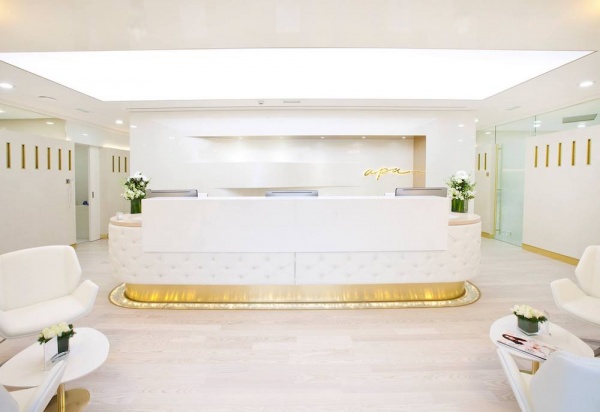
Apa Aesthetic: World-renowned cosmetic dentist Dr. Michael Apa has set the bar for high-end dentistry with cutting-edge offices in New York City, Los Angeles, and Dubai boasting a clientele that ranges from Hollywood A-list celebrities to Insta-worthy influencers like Huda Kattan and members of royal families and foreign dignitaries. Known for his natural-looking handmade porcelain veneers with a price tag starting at $4,000 a tooth, a full set could set you back $70,000.
The globetrotting life of Dr. Apa is well documented on his Instagram account with 520K+ followers and is both aspirational and inspirational. Charismatic, confident, and at moments self-deprecating, the Brunello Cucinelli–clad Apa is an influencer in his own right.
His practice feels more like a luxury spa than a dental office. The futuristic design of each location incorporates on-site labs for better precision and timings for cosmetic procedures. The business has plans for locations in Miami and London. In 2016 the Apa aesthetic extended into the launch of products that fill the gap between oral care and cosmetics, with the attention to detail of a luxury brand designed for displaying sink-side.
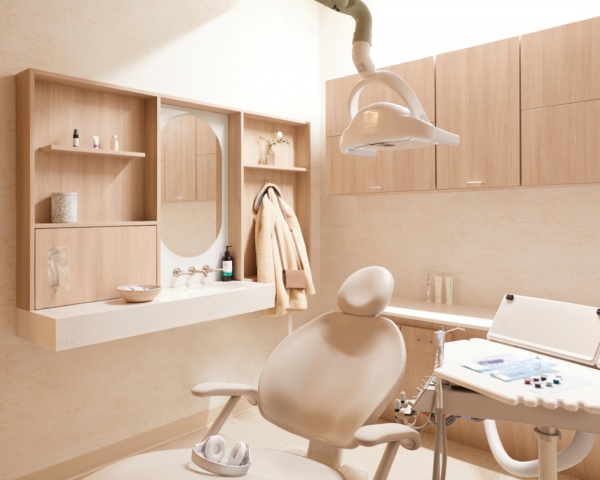
Tend: Founded by CEO Doug Hudson, Tend originated from the recognition that the highly fragmented dental industry was ripe for systemic change. The concept launched with its first location in October 2019 in the Flatiron neighborhood of NYC. The new, innovative approach to oral care infuses hospitality elements into the patient experience with offerings like visit customization and price transparency. Tend was built with the intent of creating a new standard for oral health.
Rather than your typical dental office where you would go for routine cleaning, Tend’s state-of-the-art dental clinic is designed with wellness and overall oral health in mind, using cutting-edge technology such as low-noise drills and 20-second X-ray scans to provide smarter, faster care. Patients can also access records, reference treatment plans, and connect with their clinician through their online portal. Tend’s brush bar, The Brushery, is fully stocked with a curated mix of the newest oral care products both online and in a discreet retail section of each location. Tend currently operates five New York dental studios in Chelsea, Flatiron, Grand Central, Wall Street, and Williamsburg.
Tend raised over $36 million in funding against the backdrop of the COVID-19 pandemic in October 2020. After closing its studios in March, it reopened in June with a reimagined patient journey that prioritized safety while retaining an elevated experience. Within 30 days, new patient appointments had recovered by 85%, and by October Tend’s revenue recovered by over 150%. The capital infusion will fuel Tend’s 2021 expansion plans, which include new cities and a range of oral care products.
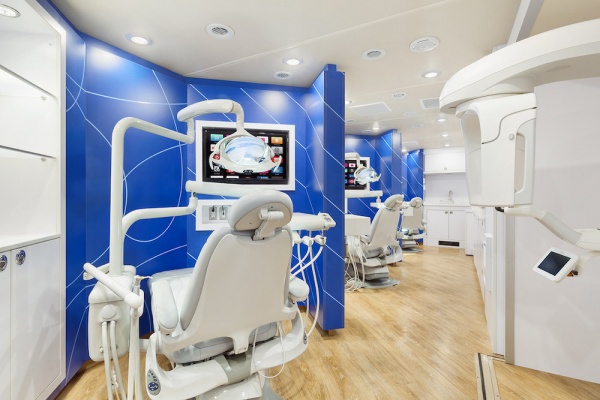
Henry: Co-founders Justin Joffe and Alexandria Ketcheson applied their collective experience in retail and beauty services to reimagine the dental practice. Launched in the fall of 2017, Henry consists of a state-of-the-art mobile dental practice and boardroom model to corporate offices, providing employees with convenient in-network dental care with an elevated patient experience, as well as a brick-and-mortar dental practice in New Jersey, offering patients a full range of general dentistry and specialty care services.
Henry’s practices are equipped with the latest technology and patient amenities, including digital imaging, BOSE noise-canceling headphones, and HBO and Netflix available for patients sitting in massage-featured dental chairs. Henry has redefined the dental experience with a patient-centric approach that saves time and improves healthcare outcomes.
For companies, there is no cost to bring Henry on-site. Henry currently services over 10 global companies—including ADP, Merck, Vonage, Audible, and CNBC throughout New Jersey, Pennsylvania, Georgia, and New York— who are all committed to employee wellness and improved access to healthcare, solving a massive problem for businesses and patients. According to the CDC, an average of 321 million work hours were lost annually to dental care in the United States. Additionally, research shows that $6 billion in lost worker productivity annually is attributable to oral disease. Henry alleviates the inconveniences associated with healthcare accessibility by offering companies in-network and on-site dental services, which save 75% of an employee’s time compared to a standard dental appointment.
In March of 2019, the business closed a $10 million Series A financing round led by Forerunner Ventures with participation from existing investors Brand Foundry and Trail Mix Ventures, bringing the capital raised to date to $15 million. The capital from this round was intended to fuel the expansion of its fleet of mobile dental practices to companies in New Jersey, Pennsylvania, Georgia, New York, and additional states across the US.
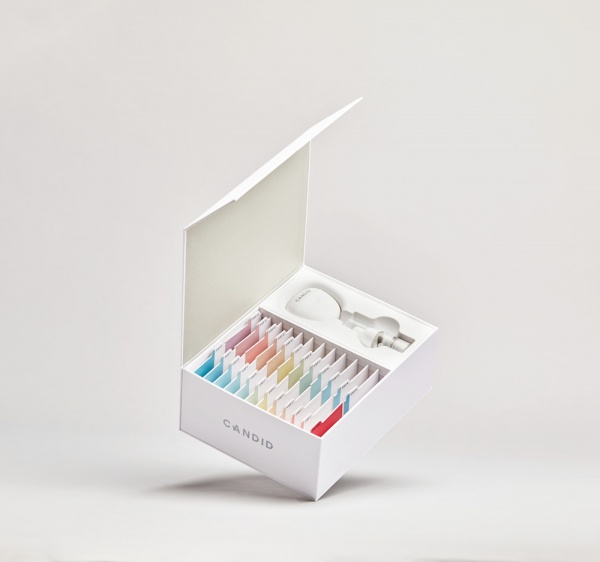
Teeth Straightening and Making Orthodontics Accessible: While braces can cost up to $7,000 and Invisalign can cost up to $8,000, new disruptors are taking teeth straightening to the masses, leveraging technology and DTC strategy.
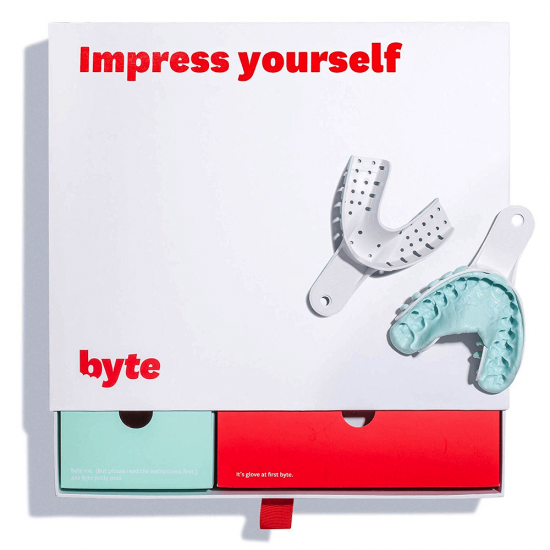
Byte: Founded by serial entrepreneurs Scott Cohen and Blake Johnson in 2017, with the first products launched at the beginning of 2019, Byte is an invisible-aligner-for-teeth company with a mission to bring more confident smiles into the world by creating a more affordable, convenient, and modern solution to the category, flipping the embarrassment of braces on its head with millennial personality and trendy branding.
Byte’s doctor-directed aligner system promises to straighten and whiten teeth from home in half the time and cost of competitors. Alongside the impression kits and invisible aligners, Byte also includes a whitening solution that can be used in conjunction with aligners and a device called HyperByte in all of its treatment plans. HyperByte is an extra in-mouth device that uses high-frequency vibrations (HFV) that send micropulses through the roots of the teeth and the surrounding bone, speeding up the process of alignment. HFV treatment is FDA cleared, and is offered, often at a steep price, as an in-office treatment by orthodontists. The cost of using Byte’s service is $1,895 or, if you use BytePay, $349 down and $83/month for a little over two years.
Byte is not simply focused on the addressable market of teeth straightening or even the obvious expansion to daily oral care, but rather they have teledentistry in their crosshairs. With the launch of BytePro, the brand intends to grow alongside the dental and orthodontic industry by incorporating dentists and orthodontists in the process.
The company ended 2020 with Dentsply Sirona acquiring Byte in an all-cash deal for $1.04 billion. Byte was not venture backed, but has taken a small investment from actress and investor Kerry Washington who serves as a creative advisor at byte. President Neeraj Gunsagar told TechCrunch the business was on track to reach a $100 million revenue run rate in Q2 of 2020 and, continuing at that 10x growth, Byte is expected to generate 2021 run-rate sales of at least $200 million.
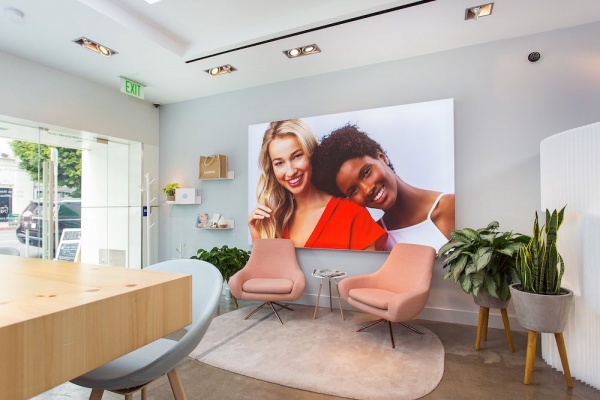
Candid: Founded in 2017 by a team of start-up veterans with experience across healthcare, hospitality, tech, and finance, the brand is backed by aserious pedigree and a vision for the consumerization of healthcare. The concept centers on democratizing teeth straightening by printing 3D FDA-approved aligners designed for people who need mild-to-moderate orthodontic work.
The hybrid model combines the high touch of physical outlets and the scalability of DTC, all supervised by orthodontists either in person or virtually. Candid currently operates 27 brick-and-mortar locations located strategically in SmileDirectClubs’ hotspots where current population levels have room for a new player, with plans to expand to 60 locations across the US in 2021.
In Candid’s physical locations, customers can get their teeth scanned and order aligners within 30 minutes, or the assessment can be done virtually. A diagnostic starter kit is $95, but in DTC style it’s frequently on sale, and if you’re not a candidate they’ll refund the price. The cost of aligners is $1,900 upfront or $88 per month over two years.
In April 2019 the teeth-straightening start-up raised $63.4 million in a Series B round from Greycroft, Bessemer, e.ventures, and others, bringing its total funding to $90 million.
The Future: The future of dentistry lives at the intersection of health and wellness and beauty and cosmetics, where the patient’s experience is front and center with hybrid models combining the high touch of physical retail and the scalability of DTC. A trip to the dentist will be a holistic experience, connecting oral care with wellness and extending into beauty through enhancing the desire for a perfect smile with cosmetic enhancing products.